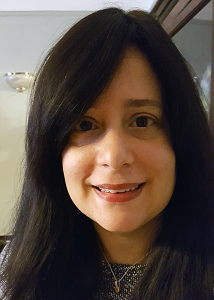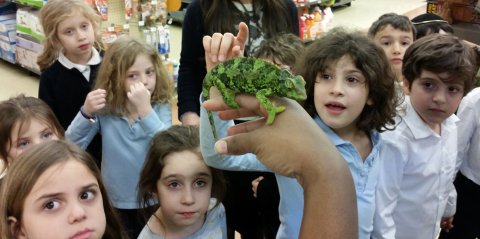Educator Spotlight: Bringing Mitzvot to Life with Sarah Alevsky

Sarah Alevsky is the director of Kivun, an after-school program for students who attend Harlem Hebrew Language Academy Charter School. Kivun is a project of Chabad of the West Side and a member of The Hebrew Charter Jewish Enrichment Network, a project of The Steinhardt Foundation for Jewish Life in cooperation with The Jewish Education Project. Sarah was also a participant in our recent national Think Tank on Thriving.
How did you come to run Jewish educational programs (and Kivun specifically)?
I was a Chabad shlucha and had been working in Chabad houses since my early 20s. I also worked in the field of informal Jewish education, running camps and a Hebrew school. Chabad brought us out to the Upper West Side to run youth programming, so we started a Hebrew school and the Kivun program, which is now in its fourth year of operation.
Parents want Jewish education to spill over into everything their kids do. It should permeate their lives so it’s a part of who they are...
What is the purpose of the Kivun experience?
The Jewish Education Project taught us how to use design thinking to figure out what parents want for their children, so we heard from parents about their hopes and dreams for their kids’ Jewish education. They want it to be something that takes place not just in their “Jewish world” but also has an effect on the rest of their children’s lives. Parents want Jewish education to spill over into everything their kids do. It should permeate their lives so it’s a part of who they are, not just in synagogue and Hebrew school.
How does that “permeation” of Jewish education play out in Kivun lessons?
A key part of our curriculum is called Rehov Mitzvot, designed for kids to experience what their parents had asked for -- experiences of Judaism in real time in the real world so kids can make that clear connection between Judaism and daily life. We scheduled 10 field trips to various places around town and connected each visit to a Jewish idea or mitzvah. For example, the students learned about the mitzvah of tzaar baalei chayim [prevention of cruelty to animals]. They then went to Petco and learned how to care for animals. Another time they learned about bikur cholim [visiting the sick] and then went to a doctor’s office to learn about helping patients feel better. After each field trip, the children spent the lesson afterwards reviewing what happened and building upon it. So for the bikur cholim lesson, we asked them, “What can you do to help sick people when you’re in your own home?” and they decided to make chicken soup. They each got a small container, which they decorated, and took home frozen chicken soup to give to someone who is sick. So it became tangible bikur cholim they could do any time.

What’s one of the best outcomes you’ve seen from Rehov Mitzvot?
During the tzaar baalei chayim lesson, a ladybug flew into the room and the kids were trying to catch it and wanted to squash it, but once we mentioned the mitzvah they suddenly became very concerned about the ladybug and put it onto some cotton and put it into a basket. Once reminded of that mitzvah, they swooped in to take care of the ladybug. They deposited the ladybug outside and felt really good about it. I like the idea that they can look around and see that there are opportunities to do mitzvot wherever they are. So much that they do already, whether it’s being kind or noticing people who need help, is a mitzvah but now they know there’s a specific Jewish value behind it. Judaism teaches us that every mitzvah we do connects us closer to G-d. The mitzvot they are doing and learning about in Rechov Mitzvot helps connect them to G-d, to other people, and to all of creation.
I like the idea that they can look around and see that there are opportunities to do mitzvot wherever they are.
How has The Jewish Education Project supported your work over the years?
Our Jewish Education Project consultants helped give us a framework of how to approach creating this program. They got us thinking about what we want the program to look like long term to make it sustainable and make it grow. We have the consultants and the [Hebrew Charter Jewish Enrichment] Network in which we can experiment and learn more about how to bring our schools to a better place. There’s also day-to-day support. My consultant, Tamara Gropper, is always available to talk with us and give us insight into how we can do things differently or better. That’s been huge in my own development as Director, and I’ve taken a lot of what I’ve learned from the Network and brought it to my Chabad Hebrew School. I also created a Facebook group called Chabad Hebrew Schools. There are 1,000 Chabad educators in the group now! So, because Chabad educators are worldwide, The Jewish Education Project is having a kind of global impact. The impetus for creating the Facebook group was that I was eager to share my learning from my work with Tamara. I was getting so much support and so many ideas from our consultants, I wanted to share it with our Chabad Hebrew School Network.
What’s been a highlight of your time directing Kivun?
Seeing our core values come alive through learning, whether that happens in the Jewish Museum looking at Jewish art, or in a local Kosher restaurant seeing real-world applications of kashrut. I love how our students embrace these different experiences and look for personal connections to their own lives.
More Facts: Sarah runs many Chabad Family Programs together with her husband, Rabbi Chayim B Alevsky. Among her other projects are Chabad Hebrew School of the West Side, leading Girls Scouts Troop 3131, and serving as founding member of The Chabad Hebrew School Board, a central committee dedicated to helping the 350+ Chabad Hebrew Schools worldwide. Sarah lives on the Upper West Side with her husband and their four daughters (and is the proud grandmother of one adorable grandson!)
For more information, visit kivunnyc.org or facebook.com/kivunwestside.
Yonah Kirschner, former Project Manager, Digital Content and Communications at The Jewish Education Project.